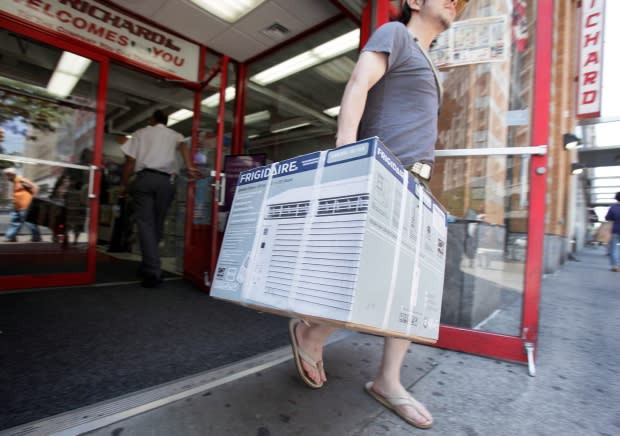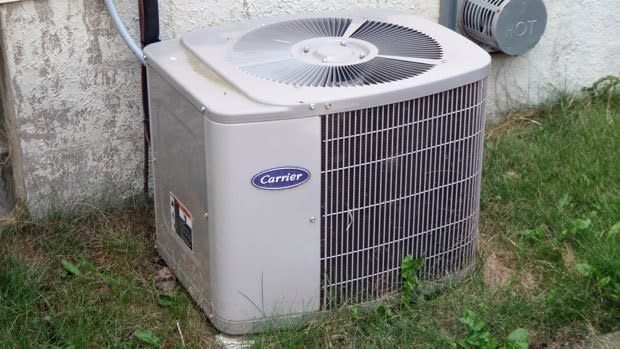Tips for getting the most out of your air conditioning unit
The hotter it gets, the harder your air conditioner has to work.
"It sounds funny because the air conditioner is absorbing the heat from your house and pushing it outside," said Jesse Homenuik, a research engineer who specializes in air conditioner components.
Temperatures in Windsor-Essex have been regularly hitting 30 degrees in the past three weeks. That's why proper AC maintenance is as important as ever — even though units tend to die on the hottest days of the year, Homenuik said.
Here are some tips from Homenuik to ensure you get the most out of your AC unit during these hot, summer days:
'Run through the simple checks'
"As a homeowner, you can always run through the simple checks," he said.
The first is to check if your vents are blowing cold air.
"You should be able to feel it about waist level. If you can't do that, it usually means that you have a blockage somewhere."

Secondly, your house should cool down by at least one degree within 30 minutes. If that doesn't happen, "you're probably low on a refrigerant charge" or the filter needs to be changed, said Homenuik.
But if you're looking for a tip that's less reliant on tools, Homenuik suggests people simply use their ears.
"If you hear a distinct hum before the compressor turns on and if it sounds like it's laborious, that hum is a good indication that your compressor is about to go," he said, adding the longer the hum gets, the harder the air conditioning unit has to work.
"You can hear it and then — Boom — it'll just drop on most likely the hottest day."
What's a SEER rating?
When buying an air conditioner, the Seasonal Energy Efficiency Ratio (SEER) is a good measure to determine a unit's efficiency, according to Natural Resources Canada.
Quite simply, a higher SEER rating equates to a more efficient air conditioning unit — which also means your wallet will be very happy.
According to Homenuik, the minimum SEER rating that most AC units have nowadays is 12 or 13. Two decades ago, the standard rating would've been about seven or eight.
"So you've doubled your efficiency," he said, adding older units might cost about $360 to run throughout the year, while a newer unit could reduce those costs to about $180.
If you're on the market for a new air conditioning unit, Homenuik recommends sticking with a SEER range of 14 to 18 "as the years progress and technology gets cheaper."
Bigger not necessarily better
Homenuik's advice for anyone looking to replace their air conditioning unit is to ensure it's just the right size.
An oversized unit, he said, can run intermittently — shutting off between five-to-ten-minute spurts. Alternatively, an undersized unit may run for more than 30 minutes, "and that's also bad for your efficiency."
Of course, an inefficient unit can lead to its quick demise, forcing consumers to shell out hundreds of dollars for a replacement. But to save money, Homenuik also suggests purchasing a unit during specific seasons.

"Spring and fall is the best time to purchase a unit because it's not busy for the contractor ... and you can haggle a lot better," he said.
"Fall is very good because they have overflow stock of air conditioners that they didn't sell. So they're looking to get rid of that so they can bring in the next year's models just like a car."
Homenuik adds it doesn't matter how rich you are if you're in need of a replacement unit or emergency repairs. That's because crews work on a first-come, first-serve basis — which is crucial to know when you consider, again, AC units tend to fail on the hottest days.
"They have a job that they need to complete and you are just in the order because everyone else is having problems."
Keeping cool without AC
There are a number of steps Homeniuk suggests people can take to keep their house cool which have nothing to do with an expensive AC unit. One method, he says, is to invest in "nice, thick drapes."
"Sunlight is the biggest thing that'll add heat to your home."
He also suggests cooking at "cooler times of the day" and turning on fans.
Or, you could plant a lot of trees around your home. Just be patient before feeling their effects.
"A nice 20-year wait there."


